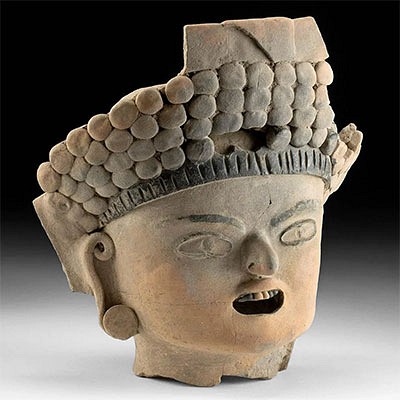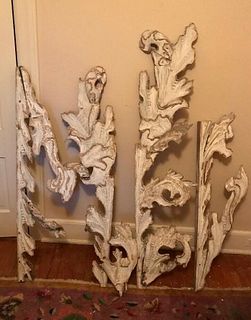Ancient Anatolian Stone Idol w/ Greek Script
Lot 69
About Seller
Artemis Fine Arts
686 S Taylor Ave, Ste 106
Louisville, CO 80027
United States
Selling antiquities, ancient and ethnographic art online since 1993, Artemis Gallery specializes in Classical Antiquities (Egyptian, Greek, Roman, Near Eastern), Asian, Pre-Columbian, African / Tribal / Oceanographic art. Our extensive inventory includes pottery, stone, metal, wood, glass and textil...Read more
Estimate:
$600 - $800
Absentee vs Live bid
Two ways to bid:
- Leave a max absentee bid and the platform will bid on your behalf up to your maximum bid during the live auction.
- Bid live during the auction and your bids will be submitted real-time to the auctioneer.
Bid Increments
| Price | Bid Increment |
|---|---|
| $0 | $25 |
| $300 | $50 |
| $1,000 | $100 |
| $2,000 | $250 |
| $5,000 | $500 |
| $10,000 | $1,000 |
| $20,000 | $2,500 |
| $50,000 | $5,000 |
| $100,000 | $10,000 |
| $200,000 | $20,000 |
About Auction
By Artemis Fine Arts
May 18, 2023
Set Reminder
2023-05-18 10:00:00
2023-05-18 10:00:00
America/New_York
Bidsquare
Bidsquare : Ancient | Asian | Ethnographic Art
https://www.bidsquare.com/auctions/artemis-gallery/ancient-asian-ethnographic-art-12797
Featuring classical antiquities, ancient, and ethnographic art from cultures encompassing the globe. Egyptian, Greek, Roman, Near Eastern, Asian, Pre-Columbian, Native American, African / Tribal, Oceanic, Spanish Colonial, Fossils, more! All legally acquired, legal to sell. Satisfaction guaranteed. Artemis Fine Arts info@artemisgallery.com
Featuring classical antiquities, ancient, and ethnographic art from cultures encompassing the globe. Egyptian, Greek, Roman, Near Eastern, Asian, Pre-Columbian, Native American, African / Tribal, Oceanic, Spanish Colonial, Fossils, more! All legally acquired, legal to sell. Satisfaction guaranteed. Artemis Fine Arts info@artemisgallery.com
- Lot Description
**Originally Listed At $400**
Ancient Near East, Asia Minor, modern-day Turkey, Anatolia, Early Bronze Age, ca. 3000 to 2500 BCE. An intriguing stone figure of anthropomorphic form presenting the characteristic abstract minimalism of an Anatolian idol - a rectangular body with sharp shoulders and a circular head - yet inscribed with ancient Greek script. A rare and intriguing example! Size: 1.4" W x 2.2" H (3.6 cm x 5.6 cm); 3.2" H (8.1 cm) on included custom stand.
Stone votive idols like this one are known in a variety of fascinating forms throughout the pre-literate ancient world. From the truly abstract Kilia-type figures that are barely recognizable as human to the exaggerated feminine shapes of so-called "Venus" figures, people in the past, as today, had a clear desire to portray human forms and did not feel constrained by naturalism. There are some repeated motifs: emphasized arms, as on this figure, which researchers have interpreted to mean an act of supplication; similarly, the wide eyes on this figure are an often-repeated characteristic that researchers believe means that the figure is attentive to the gods. Miniature figures like these seem to be portraying worshippers rather than gods, and we believe that they were small enough that ordinary people could have owned them and kept them on home altars. Many people from ancient Anatolia are found buried with items like this one.
Provenance: East Coast collection, New York Gallery, New York City, New York, USA, acquired before 2010
All items legal to buy/sell under U.S. Statute covering cultural patrimony Code 2600, CHAPTER 14, and are guaranteed to be as described or your money back.
A Certificate of Authenticity will accompany all winning bids.
We ship worldwide and handle all shipping in-house for your convenience.
#137141Expected nicks, chips, and abrasion, as commensurate with age. Otherwise, intact and in nice condition with good preservation of form and liberal remains of detail.Condition
- Shipping Info
-
All shipping is handled in-house for your convenience. Your invoice from Artemis Gallery will include shipping calculation instructions. If in doubt, please inquire BEFORE bidding for estimated shipping costs for individual items.
-
- Buyer's Premium



 EUR
EUR CAD
CAD AUD
AUD GBP
GBP MXN
MXN HKD
HKD CNY
CNY MYR
MYR SEK
SEK SGD
SGD CHF
CHF THB
THB













